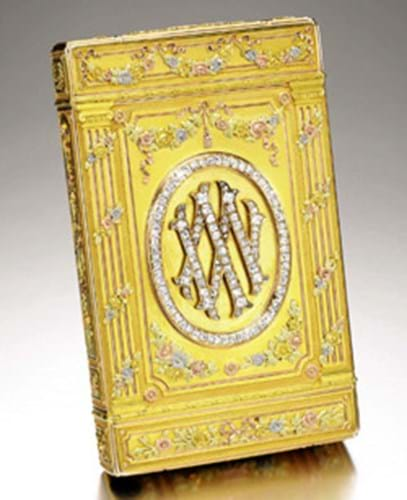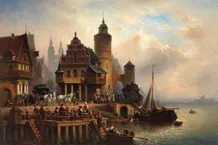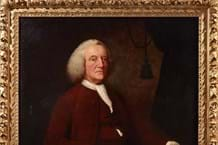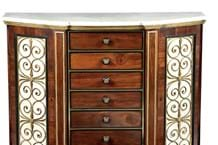
In all, seven Russian auctions were held last week at Sotheby's, Christie's and MacDougall's (all 25/20/12% buyer's premium). They raised a combined £31m hammer - no small fry for any market but below presale expectations of £40m-55m.
This was down on the total for the equivalent sales last year, but this winter series performed better than the sales in June.
Nevertheless, buyers were again cautious and there was none of the carefree spending of the boom years with the notable exception of Sotheby's£5.83m sell-out auction of Romanov heirlooms on November 30.
Here, bling, provenance and a hefty dollop of romance was offered in spades at the sale entitled Romanov Heirlooms: The Lost Inheritance of the Grand Duchess Maria Pavlovna.
The room was packed with bidders from Russia, America, Asia, Europe and the Middle East eager to get their hands on a Fabergé cigarette case or a pair of cufflinks, gilded with a romantic Imperial connection.
Grand Duchess Maria Pavlovna, wife of Grand Duke Vladimir, the brother of Tsar Alexander III, was known as the 'Queen of St Petersburg' in pre-Revolutionary Imperial Russia, but revolution forced her to move to France in 1920, where she died soon after.
However in 1918, a Professor Bergholz had arrived at the Swedish Legation in Petrograd with two pillowcases, hastily stuffed with cigarette cases and cufflinks, which he deposited there on behalf of the Grand Duchess Vladimir. They remained in the safe hands of the Swedish Diplomatic Service and, although forgotten, were discovered in the secure care of the Swedish Foreign Office in Stockholm in January of this year.
The 110 lots of 'lost inheritance' offered at Sotheby's were being sold by the descendants of the Grand Duchess and excited feisty bidding both in the room and on 60 phone lines, with every lot sold for a total of £5,83m, well over a £600,000-900,000 pre-sale estimate.
Nominal estimates were disregarded - the first lot, a silver cigarette case bearing an enamelled portrait of Emperor Alexander II, estimated at £3000-5000, set the tone of the sale by selling for £38,000.
But this paled in comparison to the highest price of the sale. A Fabergé Imperial jewelled four-colour gold cigarette case made in 1899 for the Duke and Duchess' 25th wedding anniversary, pictured here, which set a new auction record for a Fabergé cigarette case by selling to a private American buyer for £510,000, ten times the low estimate.
And the two cotton pillowcases? They made a mere £4800 and £3800 apiece.
A more sober atmosphere prevailed at Sotheby's Russian Art evening sale which followed immediately after the Romanov extravaganza. Bidding here was selective as 17 of the 36 lots failed to sell and the sold-by-value rate was only 46 per cent.
The hammer total was £3.45m, with the top lot being Alexander Exter's (1884-1949) abstract Venice that sold on low estimate at £900,000 to a Russian private buyer.
Unusually, the auctioneers made more from their 167-lot day sale on December 1 which totalled £3.51m, while Sotheby's mixed-owner Russian works of art sale raised a further £3.12m.
Meanwhile, Christie's offered paintings, works of art and jewellery over two days on December 1-2. They raised £7.31m from 277 lots with a 70 per cent take-up. The 79-lot picture section performed slightly better, achieving an 80 per cent selling rate.
Their highest price of £850,000 went to Nicholas Roerich's (1874-1947) Legend from 1923, estimated at £700,000-900,000.
MacDougall's raised the highest total for a Russian paintings sale in the series when their 391-lot auction on December 3 made £6.86m hammer, although they sold only half the lots on offer.
Their top lot was also by Nicholas Roerich whose Sangacheling sold for £950,000 against a £500,000-700,000 estimate. It was the highest price of the series.
William MacDougall said: "The Russian art market has been in recovery since April. It's not a roaring boom, but a clear recovery nonetheless. Oil prices are up, the Russian and world economies are in recovery, and people have to put their money somewhere."
MacDougall's icons sale on December 2 made a £642,850 hammer total.
By Alex Capon and Anna Brady




